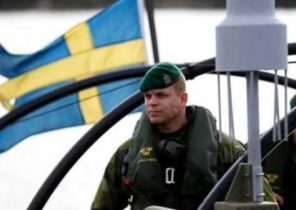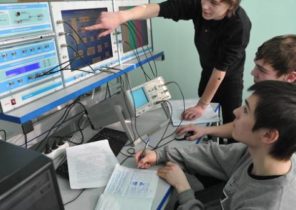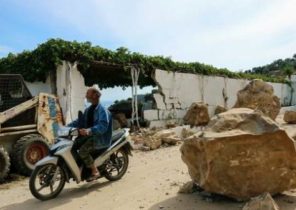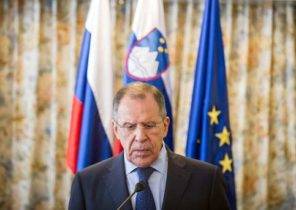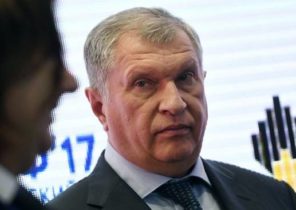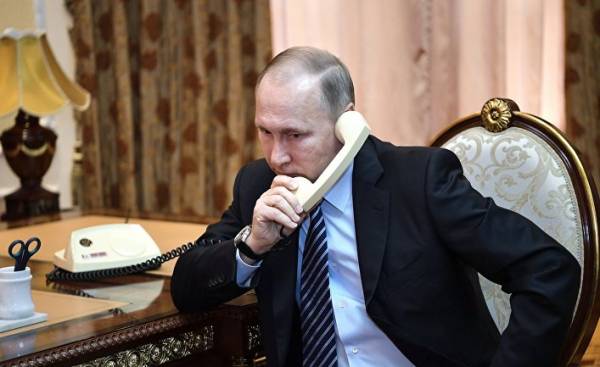
The political opposition in Russia, it seems, has gotten a second wind. The new generation no longer afraid to take to the streets, despite the fact that they risk being caught and beaten by the police. “Generation Youtube” inspiring critic of the regime and the exposer of corruption Alexey Navalny who, despite the opposition of the authorities, is going to run for the next presidential election. Journalist and writer Stig Fredrickson analyzes what it means for President Vladimir Putin and his desire to a landslide victory in the elections.
All based on the fact that Vladimir Putin in March of next year is going to afford to re-elect themselves on a new six-year term as Russian President. Its stable position in power seems to be out of danger, and the indicators of its popularity, according to polls, is still very high.
However, there are a number of questions about the future of Putin. He has never given his people any information about whether he is going to run, and he’s probably planning to wait with it as long as possible. Putin never reveals his cards.
What if Putin said that he was tired? In October, he will be 65, and he was the leader of Russia longer than anyone in modern history, with the exception of Brezhnev. If Putin will resign before the election, he will follow the example of Boris Yeltsin, and then he will appoint a successor and take care of the security assurances their assets and protect themselves from possible claims ever held accountable.
But now most of the signs indicates that Vladimir Putin is still quite power hungry and wants to run for reelection. His victory in the upcoming presidential elections, however, no longer seems such a simple and confident as a year ago. The political opposition, which was crushed after protests in 2011-2012, suddenly got a second wind, and the developments around Alexei Navalny put Putin in front of a difficult dilemma.
My conversations for several days in Moscow, including with other members of the opposition who oppose Putin’s rule, creating the impression that criticism of Putin has restored his courage. My impression is also confirmed by protests against corruption among those in power, which took place on 26 March this year: they showed that it is now not afraid to take to the streets in the younger generation, despite the fact that they are, in the words of Putin, “I can get a baton on the head.” I was struck by how fast is the recovery of the Russian opposition. At least in big cities there are a lot of remarkable young people who are willing to make demands, to achieve a better society.
In the March protests in hundreds of cities, from Vladivostok to St. Petersburg was attended by thousands of students, many of them minors. Despite the blatant interference of Riot police, they have expressed their dissatisfaction with what that they consider wrong in the system created by Putin and his retinue. They have nicknamed the “Youtube Generation”, and their mentor and the inspirer of the Bulk, which turned the Prime Minister Medvedev in the fun of representative power in Russia, and now calls for new protests and demonstrations on June 12, the national day of Russia.
The company made the Bulk of the former oil billionaire Mikhail Khodorkovsky, who from his exile in the West has launched a movement “Tired”. Khodorkovsky wants to create in Russia public opinion that the country is quite 17 years of Putin’s rule, and that Putin’s time to announce that he would not run for re-election. Khodorkovsky also calls for protests on June 12.
Khodorkovsky hopes, probably in vain, and its support among the Russian weak, as many remember him as a shameless oligarch. But his ten years as a political prisoner provided him with respect, and Khodorkovsky himself said that working in the long term. The first goal to achieve after Putin equitable and fair presidential and parliamentary elections.
Putin controls all the institutions of power in Russia and can easily strangle any street protests and demonstrations on June 12, no matter how ambitious they become. But the consequences of the resumption of atrocities can be devastating. This may call into question a landslide victory in next year’s election, which, presumably, Putin wants to achieve.
Observers in Moscow believe that Putin wants to strengthen his re-election indicators 70-70. Must be a 70 percent turnout, 70% of the votes should be given to Putin. It is clear that much can be achieved “administrative methods”, that is, with the help of this fraud, which was perfected in Russia during the 2000s. But everything has its limits. And just then appeared on the scene Bulk.
Bulk travels throughout Russia and trying to open the electoral office to register his candidacy for presidential elections. He was everywhere hindered, but he seems firmly set on confrontation with the current government. I will run in the elections, he repeats.
Putin and his administration can find formal reasons to prevent Navalny from running. Hanging Navalny a suspended sentence, and, according to the law, he has no right to be a candidate.
Putin’s dilemma is that if the Bulk does not allow to run, there is a risk that many of Navalny supporters, especially the young, stay at home. The boycott of the elections can be so massive that Putin’s victory will not count as legitimate. But if Navalny will be allowed to become a candidate, he might get enough votes that Putin will not get his 70%. Most likely, however, that before the election, Navalny will not allow.
But Putin has other, except for the Bulk of the problem. Since no real opposition to Putin or the ruling party “United Russia” had not developed in next year’s presidential elections can turn into a tedious repetition of the picture that in the last election. Whether Putin’s opponents again, the same Zyuganov from the Communists, Zhirinovsky from the liberal democratic party and Mironov from “Fair Russia”? A lot of enthusiasm this set will cause the voters? If we can achieve a 70 percent voter turnout if the candidates, by and large, the same as the last, and in the last times?
In the 2012 elections as an independent candidate allowed to participate businessman Mikhail Prokhorov, in the first place “urban and contemporary” voters have an alternative. Prokhorov got 8%, Putin is 64%. While such a candidate who could run with the blessing of the Kremlin, in the field of view there.
But maybe he will appear as required at least one new name to excite some interest to the election in March. In Moscow I heard, as it was called by a name that seems absurd. And on the other hand, maybe not. Just imagine if Ramzan Kadyrov, the controversial and feared leader of Chechnya, will be a candidate in the Russian presidential election! In this case, Kadyrov, presumably, will run purely formal, it would simply provoke people to vote for Putin. But he could definitely attract a few million Muslim votes to Putin, otherwise it would be difficult to achieve.
Such a scenario is of course implausible. But one thing is certain: the workers of the Kremlin is now very busy with the solution of the dilemma, which turned out to Vladimir Putin — both because of the extra-parliamentary opposition and due to the lack of opposition within the official party.

